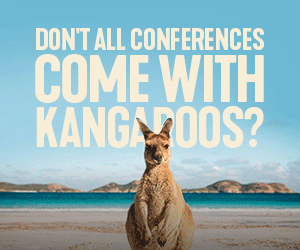How to optimize social media for your next event

As event professionals, we know the value of social media. First of all, there is the social significance—social platforms can introduce people, unite them and help maintain connections. But there’s also a marketing value. When the content of your conference spills onto the radars of non-attendees, it can increase sponsorship value and lead to more registration at future events.
For most organizations, it’s not a question of “should we use social media?” but “how can we best use social media?” With this in mind, these five tips will help you (and your event) transform from social media lite to record-setting socialite!
Start before the event. Use your organization’s social media platforms (for instance, Facebook or LinkedIn) to catalyze a conversation before arrival. Pose questions about which sessions folks are looking forward to attending most or what type of professional lessons they’re hoping to acquire. The people who respond will likely be the same crew who will be most vocal (on social media) during the actual event. Get to know these people — they are resources.
Appoint official social ambassadors. Select a handful of your most influential attendees and invite them to be ambassadors for your event. This elite social team works closely with the event’s social media manager, and could tackle a variety of initiatives: taking helm of the official Twitter account (for a given period of time), posting photos of participants on the official Facebook page or using personal accounts to help encourage dialogue. In exchange for the skills of social ambassadors, offering some type of compensation is appropriate.
Publicize the official hashtag everywhere. These days, it’s a major planning faux pas to have an attendee ask a planner what is the official hashtag. Write it on the walls. (Sample: “Feel free to tweet quotes from speakers — just be sure to use the hashtag #). Ask presenters to incorporate the official hashtag into their visual material. Have the hashtag front and centre on official conference gear. Not only does plastering the hashtag help attendees join a conversation, but seeing it also offers the power of suggestion—we are more likely to post updates on Twitter and Instagram if we see a hashtag. Think of the famous Field of Dreams analogy: “If you publicize it, they will tweet.”
Listen. Respond. Engage. Hosting a social-savvy event requires work. But with the right mind-set, monitoring social feeds should be less “work” and more “play.” The role of the event social media manager is twofold: responsiveness and animation. Responsiveness is making people feel heard by replying to any inquiries or concerns, as well as sharing the joys and breakthroughs of the meeting. The second role—animation—involves encouraging participation through posing questions, requesting photos and touching base with attendees. So make sure you listen, you respond and you engage.
Keep track of exposure. Most social media platforms offer some type of analytics tool. Not only do numbers help to prove the validity of social media to your clients and/or supervisors, the data will also come in handy when seeking sponsors for your next big event. Make sure to nab screenshots of posts from your most prominent attendees. And if you want to increase participation? Offer a prize for the most influential tweet of the conference. Put poignant quotes on a wall, next to a sponsor logo (and watch the tweets come rolling in). Finally, tell your attendees that you’re trying to break a social media record, and that you need their help. When everyone’s chipping in, magic happens. Just make sure to track the magic.
Article originally published by Tourisme Montréal
Other Articles
About Us
Supported by the Union of International Associations (UIA), the International Association of Professional Congress Organisers (IAPCO) and the Interel Group, the global public affairs and association management consultancy, Headquarters Magazines serve the needs of international associations organising worldwide congresses.















